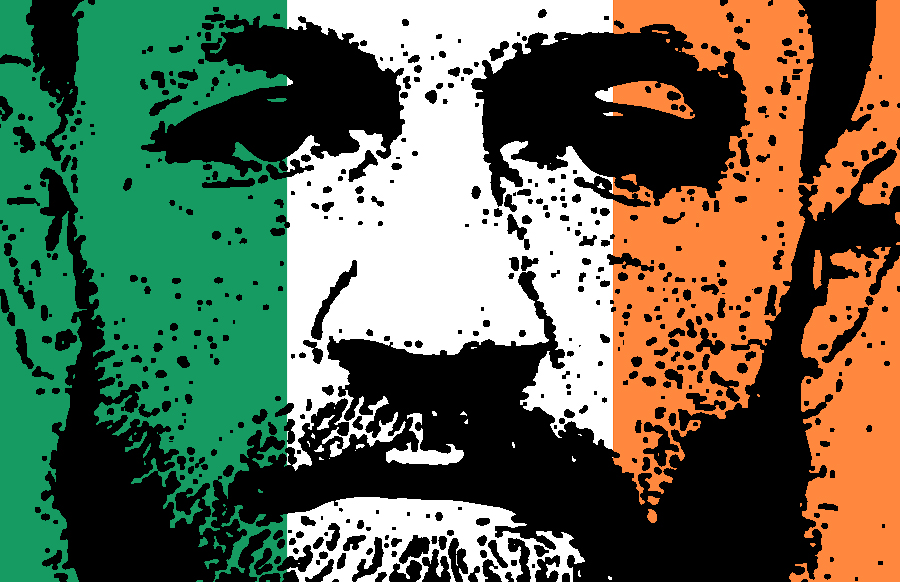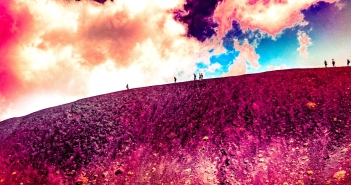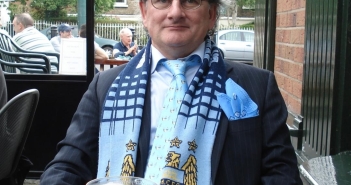Greater in combat
Than a person who conquers
A thousand times a thousand people
Is the person who conquers himself
Gautama Buddha, the Dhammapada, (third century B.C.E.)
There is no opponent
Who the fuck is Jose Aldo?
There is no Jose Aldo,
There is no no-one
You’re against yourself,
You’re against yourself.
Conor McGregor, Interview, (2013)
Anyone with even a passing interest in combat sports cannot but be aware of the terminal decline of a one-time candidate for the greatest Irish sportsman of all time, Conor McGregor.
For a time, when he could do no wrong, it seemed like the entire Irish nation was behind McGregor. The pride of a fighting nation. There were a few dissenting voices admittedly, who wisely recognised a crassness and thuggery to his character. A premonition, perhaps, of what was to come. The rest of us were mesmerised by the meteoric rise of the dual-weight UFC champion.
The Irish sportsman has almost always been a plucky underdog, destined to fail at the highest level.
Our national rugby team, ranked number one in the world going into the last World Cup, recently imploded with barely a whimper before the might of the All Blacks.
There have been exceptions, it is true – Padraig Harrington and Brian O’Driscoll, for example – but Irish people seem to bear a psychic wound handed down from a colonial legacy of brutal suppression. As a nation, we don’t believe in ourselves.
Mould-breaker
McGregor broke that mould, and for a time, we celebrated him for it. Many of us, myself included, were seduced by the story of a plucky kid from Crumlin who became champion of the world.
McGregor was the law of attraction in action, and became probably the most recognisable Irishman in the world. His self-belief, audacity and sheer natural athleticism were a sight to behold. He was that most un-Irish of Irish sportsmen, one who backed himself against the very best, and won.
For a time, everything he touched turned to gold. I vividly remember the high points: getting up at 5am to watch his six-second-demolition of the reigning champion Jose Aldo; he showed what dedication, self-belief and hard work could do. ‘Who the fuck is Jose Aldo?’, he said, ‘You’re against yourself.’ Did he have any idea how prophetic those words were?
Pantomime Gangster
It is time to call McGregor out for what he has become: a caricature of a nineteenth-century punch-drunk, stage Irishman. An empty vessel behind which lurks self-destruction and self-loathing. A false hero. A morally bankrupt shell of a man.
An immutable law of the universe is the higher you rise, the further you have to fall. Just as McGregor’s rise was meteoric, so his fall has been catastrophic. It is like watching a brutal car crash in slow motion.
The decline of McGregor is not just as a sportsman, but as a man. A would-be role model has been reduced to one whose demons have taken control. He is someone who clearly needs help, not selfies and adulation.
If you invoke the gods of war, expect to be their victim in the end. In Irish mythology Cú Chulainn is our greatest warrior-hero. Unsurpassed in battle, even he eventually meets his doom when An Morrígan, the Celtic goddess of the battlefield, turns against him, leaving his corpse tied to a standing stone with his own spear driven through his gut. W.B. Yeats evoked the scene in ‘Cuchulain Comforted’, (1939)
A man that had six mortal wounds, a man
Violent and famous, strode among the dead;
Eyes stared out of the branches and were gone.
Similarly, McGregor invoked the gods of war, who smiled on him for a time, before turning on him.
Yet McGregor’s fall began slowly, almost imperceptibly. For a long while we, as a nation, looked the other way and ignored the excesses. This seemingly loveable rogue could do no wrong. He said controversial things, ‘but sure that’s grand, he’s Irish.’ With a twinkle in the eye he could get away with it.
But no more. Now he serves as a warning to our children on what fame and excessive wealth can bring – that empty promise of chronic materialism which is the real sickness of our age.
First came the money. Ostentatious, crass and tasteless displays of wealth at a time when there are ten thousand homeless in Ireland; McGregor buys an €80,000 Gucci mink coat and brags about it on a social media account which bears painful witness to his slow descent into delusion and madness.
Gone was the bright-eyed kid from Dublin, whose positive attitude and laughter were contagious.
The press conferences, which at one time were sharp and witty, steadily grew nastier and more vindictive. The wit and humour of the early years soon dried up.
We looked away in shame at the racial taunts directed against Flyod Mayweather before that circus of a fight. He may have made one hundred million dollars, but he lost his soul that night. Or maybe he lost it last year when he was brutally demolished, choked out, by Khabib Nurmagomedov, a disciplined martial artist.
Arrested Development
And so the glint in McGregor’s eyes grew darker, his face harder, and the fuse shorter. The losses seemed unbearable for him, and his demons came out to play. Surrounded by yes-men, with no one calling him out, there was no bounds to his mis-behaviour.
Arrests followed for assault, ‘strong arm battery and criminal mischief’; lurid headlines; different cities, new countries, but the same old story.
Images revealed McGregor on yet another rollover – out of his mind on drink and drugs. The signs of chronic cocaine and alcohol abuse evident for all to see. Then came photos of McGregor mingling with some of Dublin’s most notorious mobsters – men with the blood of many victims on their hands. McGregor had become notorious alright, but not in a good way.
Recently he was found guilty in a Dublin court of a shameful and unprovoked assault against an older man in a Dublin pub. The CCTV footage catches him red-handed. One can only imagine what happens behind closed doors off camera.
Worse still are the sexual assault allegations, though of course anyone is innocent until proven guilty, and McGregor deserves the presumption of innocence.
‘Never let the truth get in the way of a good story’
McGregor was a showman, never a real person. A pantomime gangster in a twenty-first-century Punch and Judy show. The story of his notoriety is based on a lie. The hardman attitude, the association with real criminals were contrived to create a false persona.
As they say in Dublin: ‘Never let the truth get in the way of a good story.’ He was never supposed to start believing his own bullshit.
Somewhere along the road, the dream became a living nightmare. Now stuck in a circus of his own making, he is the ringmaster who no longer wants to play the role. But with the lions circling, like all doomed heroes, he is in the hands of his inescapable fate.
What we are also seeing is the moral bankruptcy of UFC itself. There is something rotten in the state of Nevada. What does it say for a sporting code when its greatest heroes, McGregor and John Jones, fall from grace in such spectacular fashion?
False comparisons have been made between McGregor and Mike Tyson, but Tyson grew up in a real ghetto. His mother was a prostitute and from childhood Tyson had to fight just to survive. Today, Tyson has tamed the monster within and has largely redeemed himself.
McGregor had choices. He grew up in a functional family in the working class Dublin suburb of Crumlin. The Image McGregor has cultivated of being from the ghetto are designed for his American fans. He took a decision to associate with gangland criminals and thugs, and assumed the role of a pantomime gangster.
Out of control
It is clear now that McGregor has been out of control for several years with illusions of invincibility. In a country with more stringent laws than Ireland, he would probably be behind bars already. For his own, and others’, safety that seems like the best place for him.
Perhaps the demons were always there, and it’s possible that one too many punches to the head have damaged him more deeply than we are aware.
Maybe the pressure of living a lie in a toxic world of fame and wealth inevitably leads to this. No doubt, living without constraints would test anyone’s character.
Money can’t buy class, and it certainly doesn’t lead to happiness. It can buy you time though, but however painfully slow, the wheels of Irish justice will turn.
The Irish state has an embarrassing record of tolerance for the rich and famous breaking the law, and our sexual assault laws, and criminal justice system more generally, are outdated and not fit for purpose. It could be years before any trial occurs, if it ever comes to pass. Money has a way of making these things go away. But even if allegations magically disappear, reputational damage cannot.
An addict in full self-destruct mode with bottomless pockets owning a whiskey company. What could possibly go wrong? The lunatics have taken over the asylum. Like any addict who has lost the ability to make rational choices, McGregor is trapped in pit of self-pity, self-loathing and resentment.
In archetypal Irish fashion, McGregor has become a dirty family secret. Since the spiral of his decline began, collectively we have just stopped talking about him. ‘Nothing to see here, move on.’
But we need to talk about Conor McGregor.
We need to draw a line.
This behaviour is not ok.
Not in our name
Not in my name. When, and if, McGregor ever walks into the Octagon again, with the Irish flag on his shoulders, he does not do so in the name of the Irish people. The men and women who died in the pursuit of Irish independence would not permit this. He does not represent me or my people. Not in our name.
What McGregor clearly needs is help, not adoration, and to be held accountable for his actions, before the courts if necessary.
Not more selfies with the mindless fans who do not seem to care about his behaviour. No more being egged on by the sycophantic thugs who surround him, or by his equally lost family. No more glorifying the shadow side of masculinity. Do we really want teenage boys aspiring to be Conor McGregor? He is the poster-child for a failed version of Irish masculinity.
The saddest part about McGregor is what he could have been: a role model and inspiration for kids around the world. Instead he is alone in the world, alone with his demons. For all his tens of millions of dollars, I do not envy him.
We could be heroes
At this time of tremendous upheaval and change in the world, we desperately need new heroes.
As Joseph Campbell masterfully put it, a hero is someone ‘who has given his or her life to something bigger than oneself’. Not to the false and empty pursuit of money and fame like McGregor. But at least we can thank him for showing us the antithesis of a hero.
Jungian psychologist Jasbinder Garnermann describes how essential it is to confront the unconscious shadow in the human psyche in order to fight our demons:
The hero’s obliviousness to his inner nature becomes his fatal flaw … The shadow defeats kings, princes and generals, men who have fought great wars and shown superhuman courage. These are all heroes who have vanquished the external enemy. But, to a man, they have been brought down by the enemy within. And for this battle, humankind is still in training.
I take no pleasure in writing these words, in seeing the sorry fall of a fellow man. We all have our demons and fallen from grace at some stage in our lives. Conor just had further to fall, and no one to save him from himself.
Yet there is always hope of redemption, even for those who have descended to the darkest depths, but that would require McGregor to confront his demons – a fight he has shown no stomach for so far.
No matter how far we fall, each of us has the instinct for transcendence, and the hope of redemption. Maybe one day he will indeed make amends, and remember his own words:
I just feel like I can beat myself. I can beat my mind, I believe in myself so much that nothing is going to stop me
I wish him well: that he can turn things around before he loses everything, if it is not already too late.




